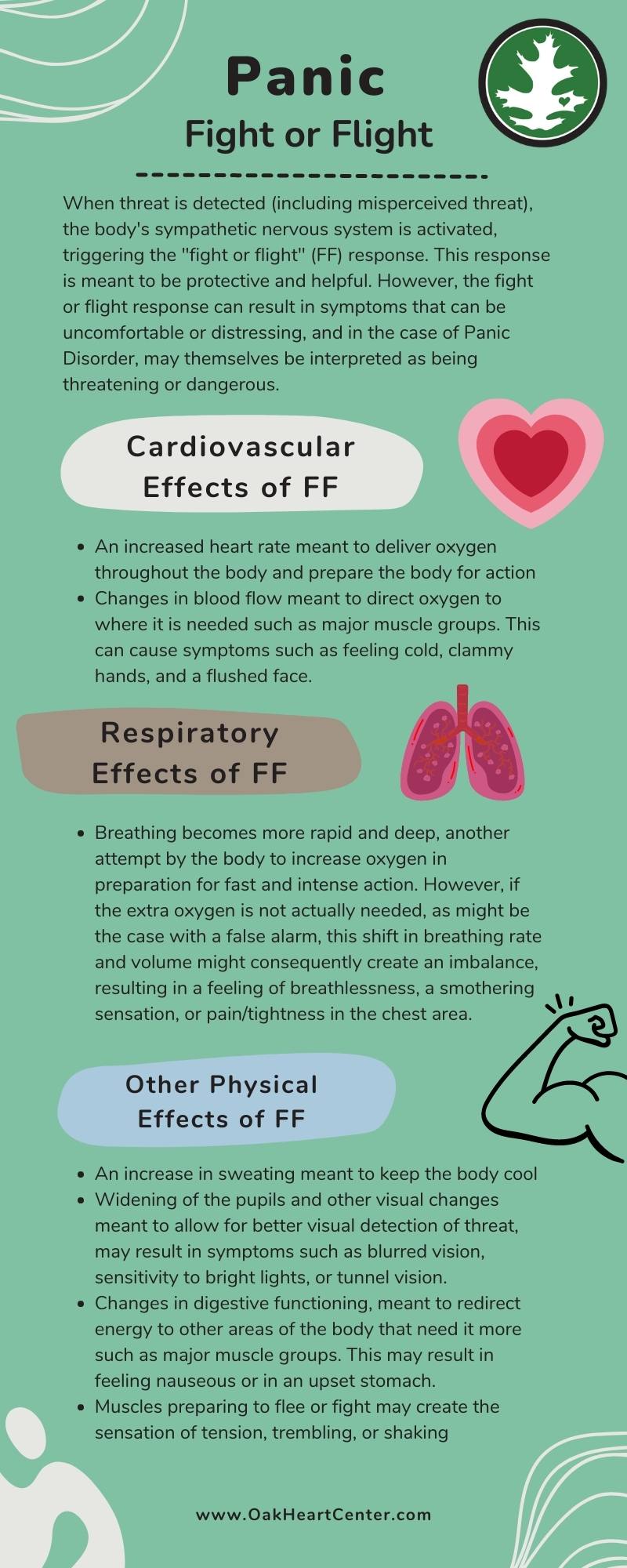Panic Disorder and Agoraphobia
|
If you are interested in counseling for Panic Disorder, call OakHeart at 630-570-0050 or 779-201-6440 or email us at [email protected]. We have counselors, psychologists, and social workers available to help you at one of our locations in North Aurora, IL, Sycamore, IL, and/or via Telehealth Online Therapy Services serving Kane County, DeKalb County, Dupage County, and beyond.
What is Panic Disorder?Panic Disorder is characterized by recurrent and sometimes unexpected panic attacks. These panic attacks often feel as though they are coming out of the blue and can sometimes even occur while someone is asleep. Panic attacks are episodes of intense fear and anxiety, with symptoms such as pounding heart, heart palpitations, fast heart rate, sweating, trembling or shaking, shortness of breath, smothering sensations, feeling of choking, chest pain, nausea, stomach distress, feeling dizzy or lightheaded, feeling weak or faint, and feelings of unreality or of having an "out of body experience." Symptoms may include a feeling of dread or that something terrible is about to happen.
People with Panic Disorder have a number of fears associated with these symptoms that typically fall into 3 groups: Physical Fears, Cognitive Fears, and Social Fears. For example, an individual with Panic Disorder might have physical fears that they are dying, having a heart attack, having a stroke, or that they are going to faint. Examples of cognitive fears are being afraid that their symptoms mean that they are going crazy, that they are going to "lose it," or that they are going to lose control of themselves. Finally, examples of social fears might include being afraid that others will see them having a panic attack and being negative judged. Some individuals with Panic Disorder express a fear that they will stay "stuck" in a panic attack forever. |
|
Because panic attacks are so distressing, individuals with Panic Disorder often worry about having them and avoid things that they believe to be triggers of their panic attacks. They also often engage in "safety behaviors" to try and prevent the attacks. For example, they may engage in the safety behavior of always having a safety person (e.g., friend or family member) with them if they are out in public or when they drive. They may always make sure that they have easy access to a phone, water, a restroom, or to their medications.
They may use superstitious objects to help them feel more safe/secure in certain situations. They may drive a certain route or avoid highways or high-traffic areas in case they need to escape. In fact, an intense need to escape is often associated with panic attacks and individuals with Panic Disorder may avoid situations where escape might be difficult (e.g., movie theaters, new places where exits are unknown, driving on roads with frequent stop lights), also known as Agoraphobia. Individual's with Panic Disorder may not always avoid triggers or use safety behaviors, but they may instead use avoidance techniques such as distraction (e.g., listening to music) or "white knuckle" through the situation. While the most intense part of the panic attack is often short-lived, to people with Panic Disorder, it can feel like an eternity. People with Panic Disorder often have a history of going to the emergency room at least once for fear that their physical symptoms are a sign of something very serious such as a heart attack or stroke. What is Agoraphobia?Agoraphobia is defined as a fear or anxiety about specific situations where escape might be difficult or where help may not be readily available in case a panic attack were to occur (or other physical symptom such as fear of falling or other embarrassing symptoms such as having diahhrea). Typically feared and/or avoided situations include public transportation, being away from home alone, crowds, standing in line, being stuck at a stop-light, enclosed spaces such as movie theaters or malls, and being in wide-open spaces such as in a rural area, parking lot, or in a boat at sea. Some individuals with Panic Disorder may not also have co-occurring Agoraphobia, but they often go hand in hand.
What is the Treatment for Panic Disorder and Agoraphobia?The good news is that there are highly effective treatments for Panic Disorder and Agoraphobia, and many sufferers are able to achieve total remission from panic attacks. First-line treatments of Panic Disorder and Agoraphobia include Cognitive Behavioral Therapy (CBT), medications, or both. In particular, a kind of CBT treatment for Panic Disorder called Panic Control Treatment (PCT) can significantly reduce symptoms and improve functioning.
PCT involves psychoeducation, cognitive restructuring, breathing re-training, and interoceptive and "in-vivo" exposures. These components are meant to help alter unhelpful thinking and behavioral patterns that cause and perpetuate the disorder. Psychoeducation will cover the fight-flight (or freeze) system in our bodies (autonomic nervous system) and how that system, along with misattributions of threat, play a role in the disorder and the cycle of anxiety/panic. Interoceptive exposures are a kind of exposure where the client is asked to face their physical symptoms without the use of safety behaviors. In-vivo exposures include facing feared situations/places without the use of safety behaviors. Ultimately, this helps the client learn that their feared consequences are highly unlikely to occur. |
Click here to learn more about Generalized Anxiety Disorder (Worry)
Click here to learn more about Social Anxiety Disorder
Click here to learn more about Obsessive Compulsive Disorder (OCD)
Click here to learn more about Health Anxiety/Illness Anxiety Disorder
Click here to learn more about Specific Phobias
Click here to learn more about Social Anxiety Disorder
Click here to learn more about Obsessive Compulsive Disorder (OCD)
Click here to learn more about Health Anxiety/Illness Anxiety Disorder
Click here to learn more about Specific Phobias
OakHeart Panic Disorder Counselors, Psychologists, and Social Workers
|
|
|
|
|
|
|
|
|
Panic Disorder Related Blogs:
|
Most of us, in our lifetime, will experience a panic attack. However, when you develop panic disorder, you experience frequent, unexpected panic attacks (or surges of intense fear and discomfort) accompanied by either a fear of having another panic attack or change in behavior related to attacks (American Psychiatric Association, 2013). In other words, you live in fear of having another panic attack and have panic attacks that feel like they hit you out of the blue. This is often a very hard way to live...(to read more, click on the link above).
|
|
I often tell my clients about Anxiety Planet. Anxiety Planet can be a lonely and scary place. And unfortunately, gravity keeps its inhabitants stuck. There are many reasons why it can be difficult to escape the gravitational pull of Anxiety Planet. The first is avoidance. The name of the game in getting off of Anxiety Planet is to make safety associations instead of danger associations. However, avoidance makes it essentially impossible or very difficult to make safety associations, therefore danger associations dominate...(to read more, click on the link above).
|
Resources
Panic Disorder Statistics
Panic Disorder General
Understanding Panic Disorder (ADAA)
Symptoms of Panic Disorder (ADAA)
Treatment of Panic Disorder (ADAA)
Panic Disorder Anxiety and Depression Association of America (ADAA) Resources
Panic Disorder General
Understanding Panic Disorder (ADAA)
Symptoms of Panic Disorder (ADAA)
Treatment of Panic Disorder (ADAA)
Panic Disorder Anxiety and Depression Association of America (ADAA) Resources
References
American Psychiatric Association. (2013). Diagnostic and
statistical manual of mental disorders (5th ed.). Washington, DC:
Author.













